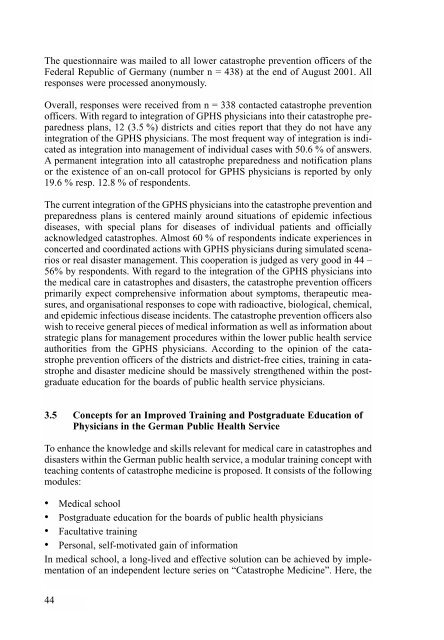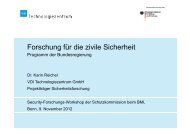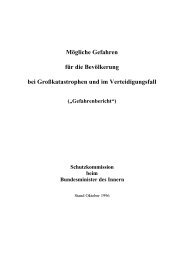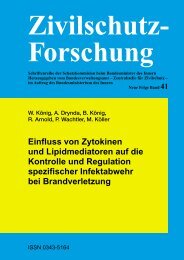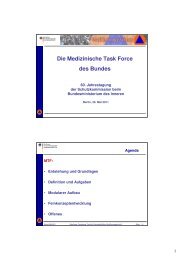Zivilschutz- Forschung - Schutzkommission
Zivilschutz- Forschung - Schutzkommission
Zivilschutz- Forschung - Schutzkommission
Erfolgreiche ePaper selbst erstellen
Machen Sie aus Ihren PDF Publikationen ein blätterbares Flipbook mit unserer einzigartigen Google optimierten e-Paper Software.
The questionnaire was mailed to all lower catastrophe prevention officers of the<br />
Federal Republic of Germany (number n = 438) at the end of August 2001. All<br />
responses were processed anonymously.<br />
Overall, responses were received from n = 338 contacted catastrophe prevention<br />
officers. With regard to integration of GPHS physicians into their catastrophe preparedness<br />
plans, 12 (3.5 %) districts and cities report that they do not have any<br />
integration of the GPHS physicians. The most frequent way of integration is indicated<br />
as integration into management of individual cases with 50.6 % of answers.<br />
A permanent integration into all catastrophe preparedness and notification plans<br />
or the existence of an on-call protocol for GPHS physicians is reported by only<br />
19.6 % resp. 12.8 % of respondents.<br />
The current integration of the GPHS physicians into the catastrophe prevention and<br />
preparedness plans is centered mainly around situations of epidemic infectious<br />
diseases, with special plans for diseases of individual patients and officially<br />
acknowledged catastrophes. Almost 60 % of respondents indicate experiences in<br />
concerted and coordinated actions with GPHS physicians during simulated scenarios<br />
or real disaster management. This cooperation is judged as very good in 44 –<br />
56% by respondents. With regard to the integration of the GPHS physicians into<br />
the medical care in catastrophes and disasters, the catastrophe prevention officers<br />
primarily expect comprehensive information about symptoms, therapeutic measures,<br />
and organisational responses to cope with radioactive, biological, chemical,<br />
and epidemic infectious disease incidents. The catastrophe prevention officers also<br />
wish to receive general pieces of medical information as well as information about<br />
strategic plans for management procedures within the lower public health service<br />
authorities from the GPHS physicians. According to the opinion of the catastrophe<br />
prevention officers of the districts and district-free cities, training in catastrophe<br />
and disaster medicine should be massively strengthened within the postgraduate<br />
education for the boards of public health service physicians.<br />
3.5 Concepts for an Improved Training and Postgraduate Education of<br />
Physicians in the German Public Health Service<br />
To enhance the knowledge and skills relevant for medical care in catastrophes and<br />
disasters within the German public health service, a modular training concept with<br />
teaching contents of catastrophe medicine is proposed. It consists of the following<br />
modules:<br />
• Medical school<br />
• Postgraduate education for the boards of public health physicians<br />
• Facultative training<br />
• Personal, self-motivated gain of information<br />
In medical school, a long-lived and effective solution can be achieved by implementation<br />
of an independent lecture series on “Catastrophe Medicine”. Here, the<br />
44


